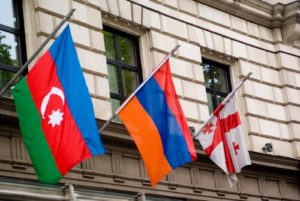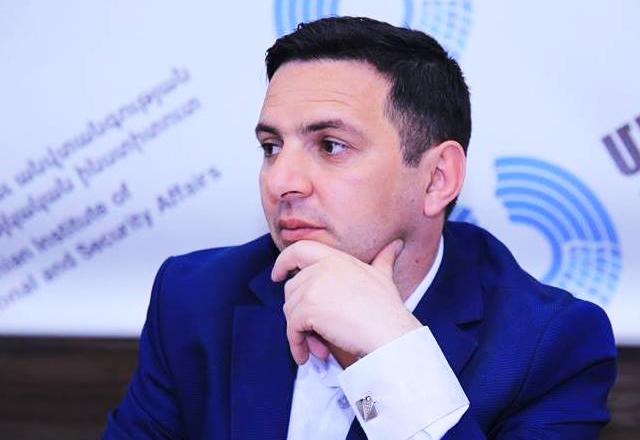 Armenia, certainly, has friendly relations with the U.S. There are no disputes between them. However, unlike their neighbors Georgia and Azerbaijan, Armenia doesn’t enjoy high-level bilateral relations. The level of meetings by U.S. officials with leaders of the three South Caucasus countries offers evidence of this.
Armenia, certainly, has friendly relations with the U.S. There are no disputes between them. However, unlike their neighbors Georgia and Azerbaijan, Armenia doesn’t enjoy high-level bilateral relations. The level of meetings by U.S. officials with leaders of the three South Caucasus countries offers evidence of this.
After the election of Donald Trump over a year ago, the highest-ranking official that the President of Armenia has met was U.S. Deputy Assistant Secretary of State for European and Eurasian Affairs Bridget Brink. While President Trump welcomed the former Georgian Prime Minister Giorgi Kvirikashvili to the White House and Vice President Mike Pence arrived in Georgia last summer. President of Azerbaijan, Ilham Aliyev, met Trump during the reception hosted by the U.S. President in connection with the 72nd Session of the General Assembly of the United Nations in New York. In addition, former U.S. Secretary of State Rex Tillerson, who attended the World Petroleum Congress hosted by Turkey last year, met with Aliyev in Istanbul. Moreover, within the framework of NATO’s recent summit, Azerbaijani Foreign Minister Elmar Mammadyarov and Minister of Defense Zakir Hasanov met with their counterparts from the U.S. Mike Pompeo and James Mattis.
Before the revolution, Armenian authorities didn’t have such high-level meetings with the Trump administration. It seems after the change of power, however, both Armenia and the U.S. are committed to a serious shift in their relations.
In late June, the President of Armenia, Armen Sarkissian, participated in the Smithsonian Folklife Festival dedicated to Armenian folk cultural heritage. Within the framework of that visit, Sarkissian met with Secretary of State Mike Pompeo on initiative of the U.S. Furthermore, an attempt has been made by the Armenian Ministry of Foreign Affairs to organize a meeting between Pashinyan and Trump. And a letter to Trump urging a meeting with Pashinyan was signed by 48 U.S. Congressmen under the initiative of the Congressional Caucus on Armenian Issues. (The timing of the meeting is suggested to be during the annual United Nations General Assembly held in New York in September. Such a meeting would be an extremely important step to broaden and deepen U.S.-Armenian cooperation.)
In his turn, the U.S. ambassador to Armenia, Richard Mills, has sent a few serious messages indicating U.S. interest in strengthening relations with Armenia. According to Mills, the priorities of the new Armenian government should be to make the economy fairer for all, to improve human rights and fight corruption. Mills also indicated all efforts will be made to attract new investments. According to him, American companies are interested in the IT, tourism, energy, mining and agriculture sectors.

“Over the past three years, $600 million worth of American investments have been made into the Armenian economy,” Mills said recently [translated from Armenian]. He also mentioned that 30 percent growth has been recorded in the past 4 months. “The possibility of investment is greater than it was when I first discussed that issue. I think the new government, whom I have met with and talked to, is very interested in liberalizing the energy market and making it more competitive and more open. It is exactly what we need,” the diplomat added.
It should be noted that during the Solar Energy Investment Conference about the prospects of renewable energy sources held in Yerevan last year, the US ambassador stressed that there were prospects for investing $8 billion in the field of renewable energy, and representatives from American leading companies were invited to get acquainted with the country’s energy opportunities.
Mills underlined that the Armenian government should create equal investment conditions. In its turn, the new government of Armenia has declared that the fight against corruption is one of its priorities, and Pashinyan has affirmed the commitment to the policy of zero tolerance towards corruption several times.
The efforts of the Armenian authorities to liberalize the economy and establish an independent judiciary are also crucial. After being elected as Prime Minister, Pashinyan stated that there will be no economic monopolies and the government will no longer interfere in judicial affairs.
Meanwhile, Armenia’s authorities expect that the amount of U.S. financial assistance will increase in the wake of the revolution. Unfortunately, until now, U.S. financial assistance has been decreasing year by year. This seems to come from a commercialization policy led by Trump. This was confirmed last year by the Deputy Chief of Mission at the U.S. Embassy in Armenia, Rafik Mansour, who stated that the ‘‘U.S. considers it a priority to move from assistance providing to trade relations with Armenia”.
Following the election of Nikol Pashinyan as Armenia’s new Prime Minister, the Armenian National Committee of America (ANCA) called upon the U.S. Secretary of State to support Armenia’s successful completion of an unprecedented, peaceful, and constitutional transition, and to consider the possibility of granting $140 million through the Millennium Challenge Corporation (MCC). Armenia’s participation was suspended following 2008 presidential election and the bloody events of March 1-2. But while Armenia continues to seek re-involvement in the MCA program, it remains excluded.
The official explanation was that according to the Millennium Challenge Corporation Act, financial assistance can only be provided to the countries classified by the World Bank as low and lower-middle-income economies based on Gross National Income (GNI) per capita. Armenia has previously been in the list of lower-middle income countries, but the World Bank has now moved Armenia to the upper-middle-income country list with more than $3,896 GNI per capita. It is noteworthy that Ukraine, Georgia and Moldova are included in the Millenium Challenges program, and some experts believe that Armenia’s exclusion has political grounds.
Nevertheless, Ambassador Mills recently stated that Washington is still considering increasing assistance to Armenia. “We are looking at what is possible, including changes in levels of our funding through USAID and other U.S. government agencies.” (Editor’s Note: The Armenian Weekly recently reported that a bill was introduced in U.S. Congress which would allow ‘debt-for-nature’ swaps for Armenia.)
Also, he issue of Amulsar will be a real challenge for Armenian authorities in the near future. As is well-known, there is a conflict between environmental activists and the Armenian branch of a mining company, Lydian International. The environmentalists are against the exploitation of the Amulsar gold mine, while Lydian has invested large amounts of money to implement the project.
Mills underscored the importance of the continuation of the international investment program of Lydian, and made it clear that the question of future U.S. investments in Armenia largely depends on how the issue of Amulsar is solved. “These potential investors are waiting to see whether now the government will follow up with some concrete actions. They also want to see how the investigations that have been launched are carried out, whether they are done in a fair manner. They are also looking around the issues of Lydian and how the government is handling those sensitive and controversial issues. Will Lydian be treated fairly in that process.”
As for the expected changes in Armenian foreign policy towards the U.S., Armenian authorities will not make serious changes to the agenda in the near future. Armenia will continue to pursue a balanced foreign policy, being a strategic ally of Russia and maintaining close relations with U.S., EU and Iran.
Luckily, in the past, the U.S. has indicated that it understands the geopolitical underpinning of Armenia. ‘‘We understand that Armenia should have strong relations with Russia given the historical grounds of mutual relations, geographical and economic ties between two states. The issue never was into which direction to go. Armenia should have good relations with the West, with the United States and Russia. Accordingly, the Armenian authorities seem to aim at developing relations with the West without spoiling the relations with Russia, and increasing the degree of sovereignty to weaken dependence on Russia.”



Be the first to comment